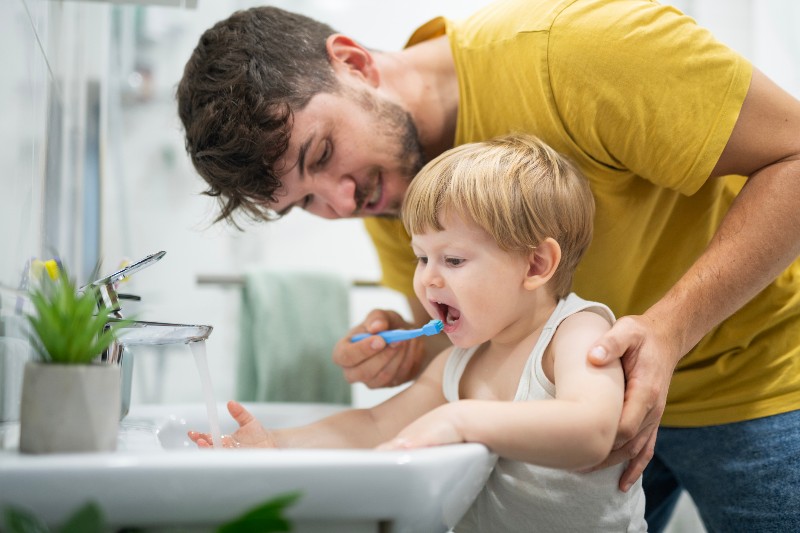How to Care for Your Child’s Teeth from Infancy to Adolescence in Kanata & Stittsville
Villanova Dental teaches you how to care for your child’s teeth in Kanata and Stittsville, ON. Watching your child grow brings countless milestones, and those first tiny teeth peeking through their gums rank among the most exciting. But with this development comes an important responsibility: establishing proper oral care habits to serve your child throughout their life. Many parents feel uncertain about when to start dental care or how to adapt their approach as their child grows. The good news is that caring for your child’s teeth doesn’t have to be complicated. With the proper knowledge and consistent habits, you can help ensure your little one develops strong, healthy teeth that last well into adulthood.
When Do Baby Teeth First Appear?
A majority of babies get their first tooth between 4 and 7 months, though this timeline can vary significantly. Some infants may sprout their first tooth as early as 3 months, while others might not see any teeth until after their first birthday. Both scenarios are perfectly normal. The process typically begins with the bottom front teeth, followed by the top front teeth. By age 3, most children have all 20 of their primary teeth. During this teething period, you might notice increased drooling, fussiness, or your baby wanting to chew on everything in sight. If your child hasn’t developed teeth by 15 months, consider scheduling a consultation with a pediatric dentist to rule out any underlying issues.
The Importance of Baby Teeth
Some parents assume baby teeth aren’t crucial since they eventually fall out anyway. This couldn’t be further from the truth. Primary teeth serve several vital functions that impact your child’s development and future oral health. Baby teeth help children learn to talk clearly and chew food properly. They also act as placeholders, maintaining the correct spacing for permanent teeth. When baby teeth are lost too early due to decay or injury, nearby teeth may shift into the space, potentially causing crowding issues when adult teeth emerge. Additionally, tooth decay in baby teeth can spread to permanent teeth, which develop beneath the gums. Establishing good oral hygiene early creates positive habits that children carry into adulthood, setting the foundation for a lifetime of healthy smiles.
When Should I Begin Oral Care for My Child?
Oral care should start before your baby’s first tooth appears. Even newborns benefit from gentle gum cleaning after feeding. Use a clean, damp washcloth to wipe your baby’s gums, removing milk residue and bacteria. Once the first tooth emerges, it’s time to introduce a soft-bristle infant toothbrush. Use fluoride-free toothpaste or water for children under 2 years old, as they will likely swallow whatever you put in their mouths. It is recommended to schedule your child’s first dental visit by their first birthday or within six months of their first tooth appearing. This early visit helps identify potential problems and provides professional guidance on proper care techniques.
Know How to Care for Your Child’s Teeth at Home
Effective at-home care evolves as your child grows, but consistency remains key. Here’s what you should know for caring for your child’s teeth:
- Infants (0-2 years): Gentle daily cleaning is essential for babies. After feeding, wipe gums with a clean, damp cloth. Once teeth appear, brush twice daily with a soft-bristle toothbrush and water. Avoid putting your baby to bed with a bottle containing anything other than water, as prolonged exposure to milk, formula, or juice can cause tooth decay.
- Toddlers (2-5 years): Introduce fluoride toothpaste when your child can spit reliably, typically around age 2. Use only a rice-grain-sized amount for children under 3, increasing to a pea-sized amount for older toddlers. Continue brushing for your child, as they lack the motor skills for thorough cleaning. Begin introducing flossing when teeth start touching each other. Make brushing fun with colorful toothbrushes, flavored toothpaste, or brushing songs to establish positive associations with oral care.
- School-age children (6-12 years): Children can start brushing independently around age 6, though supervision remains essential. This is when permanent teeth replace baby teeth, making consistent care even more critical. Continue assisting with flossing until they develop adequate dexterity, usually around age 10. Consider adding a fluoride mouthwash to the routine if recommended by your dentist, especially for children prone to cavities.
- Adolescents (13+ years): Teenagers face unique oral health challenges, including orthodontic appliances, wisdom teeth emergence, and lifestyle changes. Emphasize the importance of consistent brushing and flossing, especially with braces. Regular dental cleanings become even more crucial during this period. Address concerns about appearance-related issues like teeth whitening or orthodontic treatment, as maintaining oral health often motivates teenagers more when tied to aesthetic benefits.
Building Lifelong Healthy Habits
Creating positive dental experiences starts at home but extends to professional care. Regular checkups and cleanings help catch problems early and reinforce good habits. At Villanova Dental, serving families in Kanata and Stittsville, ON, we understand that each child’s dental journey is unique. Remember that children learn by example. When they see you prioritizing your oral health, they’re more likely to value theirs. Make dental care a family activity rather than a chore, celebrating milestones like lost teeth or cavity-free checkups. Caring for your child’s teeth from infancy through adolescence requires patience, consistency, and professional guidance. By starting early and adapting your approach as they grow, you invest in their long-term health and confidence. Schedule regular dental visits, maintain daily care routines, and don’t hesitate to ask questions about your child’s specific needs.


 1261 Stittsville Main Street, Unit #9
1261 Stittsville Main Street, Unit #9

 1261 Stittsville Main Street
1261 Stittsville Main Street


